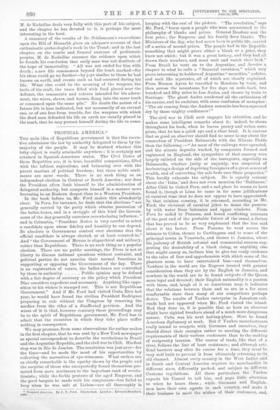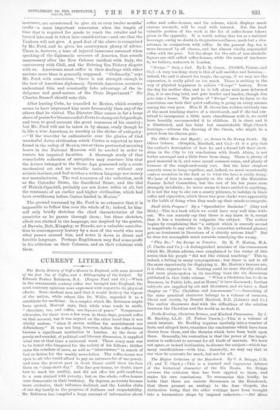TROPICAL AMERICA.* THE main idea of Republican government is that
the execu- tive administer the law by authority delegated to them by the majority of the people. It may be doubted whether this lofty object is really attainable anywhere ; it is certainly not attained in Spanish-American states. The Civil Codes of these Republics are, it is tree, beautiful compositions, filled with the loftiest aspirations, and brimming over with the purest maxims of political freedom ; but these noble senti- ments are mere words. There is no such thing as an independent election in Central or South America; nor does the President of ten limit himself to the administration of delegated authority, but comports himself in a manner more becoming to an Eastern despot than to a Western President.
In the book before us, Mr. Ford makes this abundantly clear. In Peru. for instance, he finds that the elections " are generally carried by the party which obtains possession of the ballot-boxes, and in a struggle of this kind the Govern- ment of the day generally exercises overwhelming influence;" and in Columbia, "President Nugez is very careful to select a candidate upon whose fidelity and humility he can depend. So absolute is Government control over elections that the official candidate is always elected, or at least counted-in." And "the Government of Mexico is oligarchical and military, rather than Republican. There is no such thing as a popular election. There are no public meetings, the Press is not at liberty to discuss national questions without restraint, and political parties do not exercise their normal functions in supporting or opposing the Government of the day. There is no registration of voters, the ballot-boxes are controlled by those in authority Public opinion may be defined with a fair degree of accuracy as the policy which President Diaz considers expedient and necessary. Anything like oppo- sition to his wishes is stamped out. This is not Republican Government." And if Mr. Ford had visited Costa Rica last year, he would have found the civilian President Rodriguez preparing to rule without the Congress by removing the needles from the rifles of a disaffected garrison. And the worst of it is that, however contrary these proceedings may be to the spirit of Republican government, Mr. Ford has to admit that the countries in which they take place suffer nothing in consequence.
We may presume, from some observations the author makes in the first chapter, that he was sent by a New York newspaper as special correspondent to describe the revolutions in Brazil and the Argentine Republic, and the civil war in Chili. His first stop was in Rio de Janeiro. The revolution was just over—for the time—and he made the most of his opportunities by collecting the narratives of eye-witnesses. What strikes one as chiefly remarkable is the apathy shown by the people, and the surprise of those who unexpectedly found themselves pro- moted from mere mutineers to the important rank of revolu- tionists; while the feeble protests of the aged Emperor, and the good bargain he made with his conquerors—but failed to keep when he was safe at Lisbon—are all thoroughly in
• Tropical Autcrica. By J. N. Ford. Illuotrated. London ; Edward Stanford. 18fts.
keeping with the rest of the picture. "The revolution," says Mr. Ford, "burst upon a people who were accustomed to the philosophy of blanks and prizes. General Deodoro won the first priee ; the Emperor and his family drew blanks. The Ministers of the day, who had never been in public life, carried off a series of second prizes. The people had in the Republic something that might prove either a blank or a prize, they knew not which; but it was a great lottery, and they had all drawn their numbers, and must wait and watch their luck." From Brazil he went on to the Argentine, and devotes a chapter to what he calls a "financial revulsion," which may prove interesting to holders of Argentine" securities," eedulits, and such like mysteries, all of which are clearly explained. From Buenos Ayres be travelled to Mendoza by train, and then across the mountains for five days on mule-back, two hundred and fifty miles to Loo Andes, and thence by train to Santiago. The giant Andes awakened all the enthusiasm of his nature, and he exclaims, with some confusion of metaphor: "The air coming from the Andean summits has been squeezed dry by those mighty condensers !"
The civil war in Chili next engages his attention, and he makes some intelligent remarks about it; indeed, he shows throughout his book, when he leaves poetry and writes mere prose, that he has a quick eye and a clear head. It is curious that so good an observer should find no more to say about the connection of President Balmaceda with the Nitrate Fields than the following :—" As most of the railways were operated, and the nitrate deposits worked, by companies formed and registered in England, the sympathies of that country were largely enlisted on the side of the insurgents, especially as Balmaceda, whether justly or unjustly, was suspected of harbouring a design of depriving foreigners of a great source of wealth, and of converting the salt-beds into State properties." This hardly exhausts the subject. He is equally reticent about the and does not even mention the Baltimore.' After Chili he visited Peru, and a sad place he seems to have found it, though at Lima. he came in for some jollifications at carnival time that he does not appear to have appreciated. In that rainless country, it is esteemed, according to Mr. Ford, the cleverest of carnival jokes to douse the passers- by with water from balconies and upper windows. From Peru he sailed to Panama, and heard conflicting accounts of the past and of the probable future of the canal, a future that has proved to be so very unpleasant that the less said about it the better. From Panama he went across the isthmus to Colon, thence to Carthagena and to some of the principal towns in Venezuela, and thence to Jamaica, where his jealousy of British colonial and commercial success sug- gesting the desirability of a black rising, or anything else that might annoy us, inclines him to give too ready credence to the tales of fear and apprehension with which some of the planters seem to have entertained him—and themselves. Nowhere in the world are the Negroes treated with greater consideration than they are by the English in Jamaica, and nowhere in the world are to be found subjects of the Queen more loyal and devoted; their English nationality is a passion with them, and, laugh at it as Americans may, it indicates that the relations between them and us are in a far more comfortable state than many of our competitors perhaps desire. The results of Yankee enterprise in Jamaican rail- roads had not appeared when Mr. Ford visited the island. Had they done so, it is possible that so keen an observer might have sighted breakers ahead of a much more dangerous nature. Cuba was his next halting-place. Here he found American diplomacy at work. But if Yankee manufacturers really intend to compete with Germans and ourselves, they should direct their energies rather to meeting the different requirements of their various customers than to the making of reciprocity treaties. The course of trade, like that of a river, follows the line of least resistance ; and although arti- ficial barriers may alter its course for a time, they must be very well built to prevent it from ultimately returning to its old channel. Almost every country in the West Indies and in South and Central America requires its merchandise in different sizes, differently packed, and subject to different Customs regulations. All these particulars the Yankee expects his Consul to tell him, and pays little attention to when he hears them ; while Germans and English- men have their own agents in each country, and make it their business to meet the wishes of their customers, and, moreover, are accustomed to give six or even twelve months' credit—a most important concession when the length of time that is required for goods to reach the retailer and be turned into cash is taken into consideration—and one that the Yankees will not give. A good deal of the above is recognised by Mr. Ford, and he gives his countrymen plenty of advice. There is, however, a tone of injured innocence assumed when speaking of the diplomatic reverses of America, that sounds unnecessary after the New Orleans incident with Italy, the controversy with Chili, and the Behring Sea Fishery dispute with us. Americans must suffer in their dealings with other nations more than is generally supposed. "Ordinarily," says Mr. Ford, with conviction, "there is not strength enough in the bow of American diplomacy. Spanish-American countries understand this, and constantly take advantage of the in- dulgence and good-nature of the State Department." Sir Charles Russell should note this.
After leaving Cuba, he travelled to Mexico, which country seems to have impressed him more favourably than any of the others that he visited. The Dictator Diaz comes in for a large share of praisefor his successful efforts to stamp out brigandage, and turn to good account the great resources of his country ; but Mr. Ford will not be taken in by shams, ready though he is, like a true American, to worship at the shrine of antiquity: —" If the traveller be enthusiastic over the glories of that wonderful Aztec civilisation which Cortes is reported to have found in the valley of Mexico, two or three protracted morning boars in the National Museum will be needed in order to restore his impaired faculties. A thorough study of that remarkable collection of antiquities may convince him that the Aztecs belonged to the Stone Age, possessed only a crude mechanical art and no metallic tools, were without any artistic instinct, and had neither a written language nor money nor manufactures. The real treasures of the collection, such as the Calendar Stone, the Sacrificial Stone, and the idol of Huitzil-Opochtli, probably are not Aztec relics at all, but the remnants of an earlier and higher civilisation, which had been overthrown before Cortes landed in Mexico."
The ground traversed by Mr. Ford is so extensive that it is impossible to follow him over the whole of it ; indeed, he him- self only briefly sketches the chief characteristics of the countries as he passes through them ; but those sketches, albeit not clothed in the language, nor inspired by the genius, of Darwin, Belt, Kingsley, or Fronde, are a valuable contribu- tion to contemporary history by a man of the world who sees what passes around him, and notes it down in direct and forcible language. Perhaps Englishmen may find some profit in his criticism on their Colonies, and on their relations with them.



















































 Previous page
Previous page